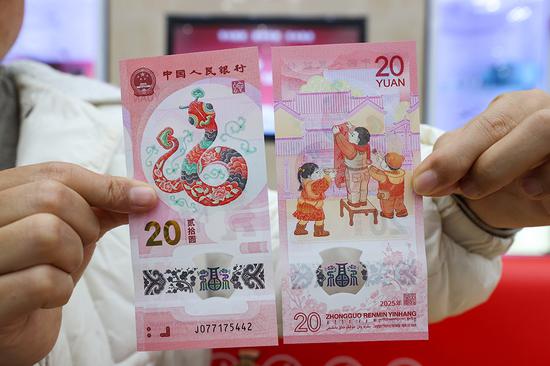China's Ministry of Commerce (MOFCOM) on Monday expressed firm opposition to U.S. new artificial intelligence (AI) export control measures, noting that the U.S. move will severely damage interests of enterprises worldwide, including those in the U.S.. It also vowed to take necessary measures to resolutely safeguard China's legitimate rights and interests.
The comments came after the Biden Administration on Monday released an Interim Final Rule on Artificial Intelligence Diffusion on the website of the White House, which will further restrict artificial intelligence chip and technology exports. The new regulations will cap the number of AI chips that can be exported to most countries and allow unlimited access to U.S. AI technology for America's closest allies, while also maintaining a block on exports to China, Russia, Iran and North Korea, Reuters reported.
These measures further tighten export controls on AI chips, model parameters, and other related items, expand long-arm jurisdiction, creating obstacles for third parties engaging in normal trade with China, a spokesperson of the MOFCOM said in a statement.
The spokesperson said that previously, U.S. high-tech companies and industrial groups expressed dissatisfaction and concern through various channels, believing that the measures were hastily introduced without sufficient discussion, constituting excessive regulation in the field of AI, which would have significant adverse consequences. They strongly urged the Biden administration to stop their introduction.
However, the Biden administration turned a deaf ear to the reasonable voices within the industry, insisting on hastily introducing the measures. This is another example of the generalization of the concept of national security and the abuse of export controls, as well as a blatant violation of international multilateral trade rules, the spokesperson said.
The Biden administration's abuse of export control measures severely hinders normal economic and trade exchanges between countries, seriously disrupts market rules and the international economic and trade order, significantly affects global technological innovation, and severely damages the interests of enterprises worldwide, including those in the U.S., the spokesperson noted.
China will take necessary measures to resolutely safeguard its legitimate rights and interests, the spokesperson said.
U.S.-based chip manufacturer Nvidia said in a statement posted on its website on Monday that the Biden administration now seeks to restrict access to mainstream computing applications with its unprecedented and misguided "AI Diffusion" rule, which threatens to derail innovation and economic growth worldwide.
While cloaked in the guise of an "anti-China" measure, these rules would do nothing to enhance U.S. security. The new rules would control technology worldwide, including technology that is already widely available in mainstream gaming PCs and consumer hardware. Rather than mitigate any threat, the new Biden rules would only weaken America's global competitiveness, undermining the innovation that has kept the U.S. ahead, the company noted.
On January 5, Ken Glueck, executive vice president of Oracle, wrote a blog post saying that the Biden administration's "Export Control Framework for Artificial Intelligence Diffusion" will go down as one of the most destructive to ever hit the U.S. technology industry, noting that the rule "does more to achieve extreme regulatory overreach than protect U.S. interests and those of our partners and allies."
"Worse, without fully contemplating the rule's effects, we are likely handing most of the global AI and GPU market to our Chinese competitors," Glueck noted.
According to Reuters, new limits will be placed on advanced graphics processing units (GPUs), which are used to power data centers needed to train AI models. About 18 countries, including Japan, Britain, South Korea and the Netherlands, will essentially be exempt from the rules. Some 120 other countries, including Singapore, Israel, Saudi Arabia and the United Arab Emirates will face country caps. And countries like Russia, China and Iran will be barred from receiving the technology altogether.
"The Biden administration's restrictive policies further reveal its strategy of rallying allies to form a 'small circle' aimed at containing China," Ma Jihua, a veteran telecom industry observer, told the Global Times on Monday, noting that the U.S. move not only harms the interests of the global semiconductor industry but also has a negative impact on domestic companies in the U.S..
Although exemptions are provided for some allies, these manufacturers face a global market. If exports to other countries are restricted, it will inevitably lead to a contraction of the market and a decline in sales for American semiconductor companies, Ma said.
The semiconductor industry has a highly globalized market, involving global procurement of raw materials, equipment manufacturing, and sales worldwide. Once the global market is artificially divided, it will lead to a significant contraction in demand for upstream companies in the U.S. that hold an advantage in the chip sector. This is tantamount to handing over the market to others, the expert further noted.
U.S. policymakers believed that with their patent and technological superiority, simply by not exporting the high-end chips to other countries, those countries would be unable to catch up. However, this notion does not hold up in reality, Ma said.
The U.S. has already initiated restrictions on exporting high-end chips to China, but this has not halted China's technological advancement. Currently, domestic operators and some computing centers almost entirely use domestic chips, having already rid themselves of dependence on American chips, the expert noted.
Moreover, there are already domestic alternatives for GPUs. Therefore, the U.S.' attempt to limit the development of China's AI by setting caps is unlikely to be truly effective, Ma noted.


















































 京公网安备 11010202009201号
京公网安备 11010202009201号